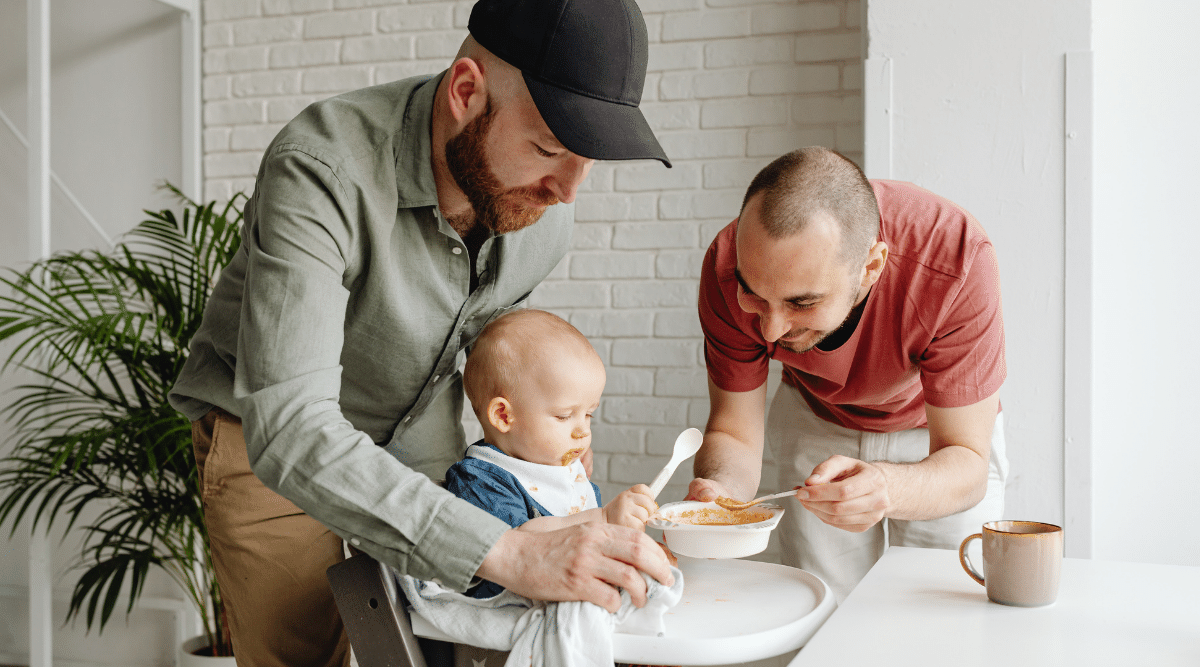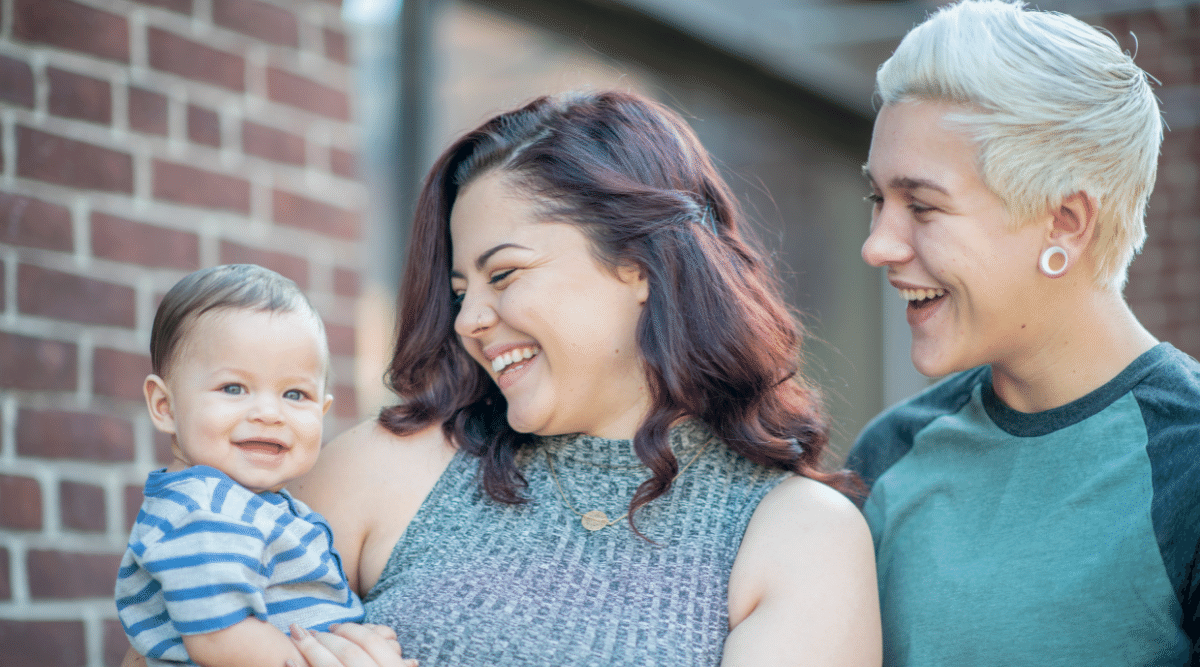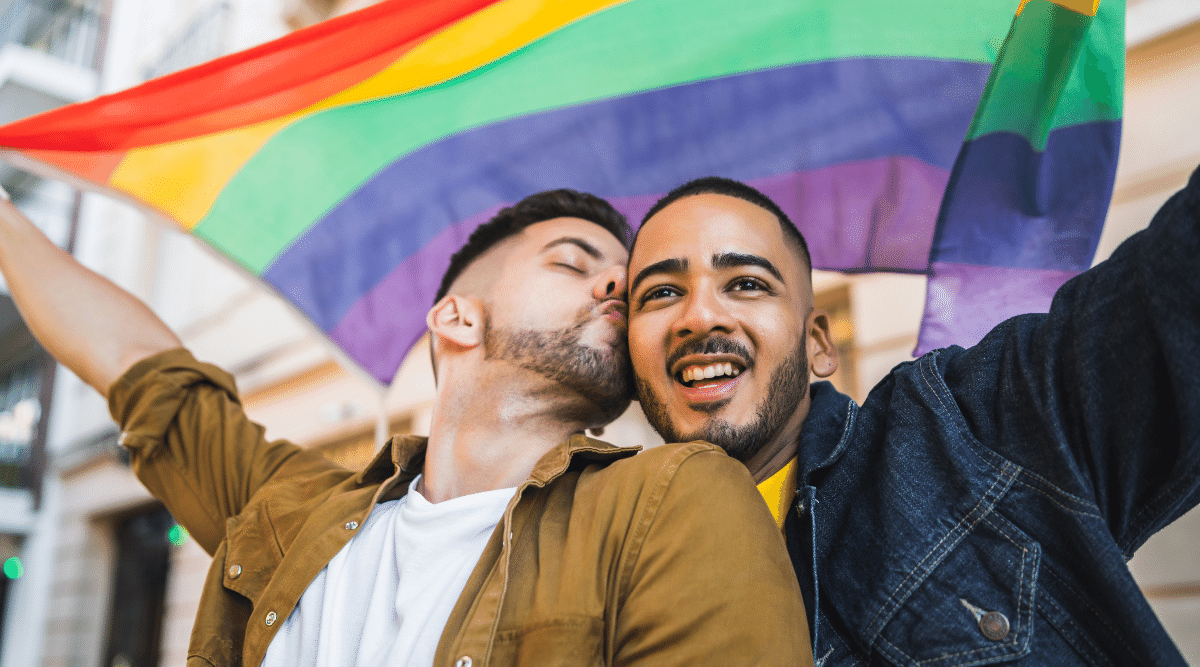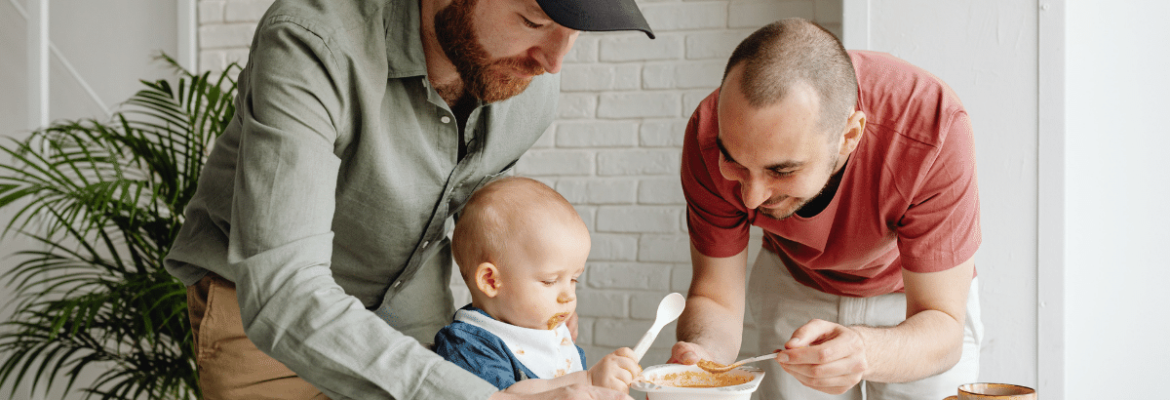LGBTQIA+ Parents – Facing Discrimination in Pregnancy & Parenthood
It should be no surprise that not all babies have a mum and a dad. The Australian Census, 2016, recorded that 15% of families with children in Australia included LGBTQIA+ parents. However, even the Australian Bureau of Statistics (ABS) openly acknowledges that this statistic likely underestimates the number of same-sex and rainbow families in Australia.
This misreckoning is because the Australia Census only records same-sex couples and not factors such as sexual orientation or single LGBTIQA+ parents. Of course, the statistics also rely on individuals’ willingness to participate and declare themselves as members of a same-sex couple. All of this indicates far more rainbow families than our current statistics suggest.
We probably should consider what we mean when we say rainbow families or LGBTQIA+. The Australian Government describes a rainbow family as any family in which at least one parent identifies as being LGBTIQA+ – that is, lesbian, gay, bisexual, transgender, intersex, queer, asexual or gender diverse.
Despite the number of same-sex and rainbow families that exist, most discussion in society assumes babies have one mother and one father. Unfortunately, many processes and systems inside health care organisations also make this assumption, resulting in LGBTQIA+ parents and parents-to-be feeling marginalised or overlooked.

Who’s the father/mother?
For lesbian and gay male parents, the question ‘Who’s the father/mother?’ is always challenging. For lesbians, the biological father of their child might either be known or unknown. For some, a friend or family member might provide sperm, which results in a pregnancy. Others may have come to pregnancy through sperm from an unknown donor and IVF.
For gay males, a surrogate might have conceived using her egg and sperm from one of the fathers. Alternatively, a surrogate may conceive using a donor egg from either a known or unknown donor. The person donating eggs or sperm might live in the same country as the parents-to-be or another country.
If your donor is known you, may choose to identify them, e.g., ‘Actually, my partner’s brother was kind enough to donate for us.’ You might casually say, ‘A friend of ours assisted us to become pregnant through IVF.’
If your donor is unknown, you might say ‘Our baby was conceived using donor eggs through IVF.’ Alternatively, you might be delighted to share all the details you know, ‘We conceived through donor sperm from a 182 cm tall Irish man who is a jeweller by trade, has five siblings, and loves bushwalking and rock climbing!’
If you specifically do not want to disclose any details, you might say, ‘Why is that important to you?’ or ‘That is a discussion we want to first have with our child when they are older.’ There is only one thing to remember here. The identity of your child’s biological parents is no one’s business. That said, to avoid awkwardness, it is good to think about what you will say if asked.
Which one of you is the REAL mother/father?
For parents in lesbian and gay male relationships, being questioned about who the ‘real mother’ or ‘real father’ is can be challenging. For lesbian parents, by virtue of an obviously pregnant belly, these questions generally start after the baby is born. However, for gay males, the question can be posed anytime from when they first announced they are expecting a baby!
In addition to being hurtful, questions that attempt to define a ‘real’ mother/father, by definition, at the same time characterise the other parent as ‘not real’ or not valid. These questions can devalue a parent and potentially cause them to question their role. A helpful response might be, ‘Our child has two real mothers/fathers.’ Alternatively, you might tell the asker that you don’t find that question respectful.

Does biology matter?
In lesbian and gay male relationships, in particular, your baby is typically conceived using the sperm/egg of one person and the egg/sperm of a donor. For some parents, biology feels entirely unimportant. Irrespective of not being biologically related to their child they feel bonded.
However, it is also completely okay to feel differently. For example, you may feel that the baby is not as much your child as it is your partner’s. You may be uncertain how you feel and are worried that you will discover you do not love them as much as your partner when the baby arrives. These are entirely normal and natural thoughts that are experienced just as commonly by male-female couples who have used donor sperm/eggs for one reason or another.
Consider talking openly with your partner about your concerns or fears. You might also like to talk to friends who have been through a similar experience. Sometimes talking about the issues can go a long way to easing your mind.
The biological mother and birth mother couples
For lesbian parents, using one woman’s egg to create an embryo, which the other woman then carries, can seem like the perfect way to overcome the ‘biological imbalance’. In this way, the parent without a biological connection to the child still has a specific role – as the birth mother, which can seem like a perfect solution for some couples – the closest thing they will ever get to a dual biological connection to their baby.
However, emotions are tricky, and not all couples or individuals can navigate this path. The woman who has provided the egg may begin to feel cheated out of carrying her ‘own’ child. This feeling might be worsened where the woman providing the egg has had fertility issues. These feelings are valid and important. Like all situations in a relationship, open and honest discussion is the best way to go.
Extended family relationships and same-sex parents
The arrival of children into a same-sex or rainbow family can cut both ways for extended family. When relationships with extended family have been strained, the appearance of children may result in a higher level of commitment. Family members may see the arrival of children as an incentive to try harder to accept your relationship so as to be included in your children’s lives.
However, back the other way, the arrival of children can sometimes be the straw that breaks the camel’s back for some families. While willing to accept your relationship to some extent, some family members may see you having children as completely irresponsible or immoral. These negative feelings may lead to a breakdown in communication and contact with extended family at a time when you need and want them in your life.
Ultimately, you cannot control or necessarily predict how your family will react to your decision to have children. However, one thing you can do is protect your relationship. How family members might respond and how you might approach adverse reactions is a good thing to talk about ahead of time. As far as your children go, the most crucial adult relationship is between the two of you.

The particular plight of transgender parents
Transgender individuals belong to one of the most stigmatised groups in society. Individuals can face anything from insensitive remarks to ignorance or downright prejudice. Before exploring these issues, a quick definition might help.
Firstly, being transgender means identifying with a gender other than the one you were defined at birth. Many transgender individuals take hormones to help bring their body characteristics in line with their gender identity. For example, this could include growing facial hair or developing breasts. Some transgender individuals also have gender confirmation surgery that permanently changes their body parts to conform with the gender they identify with.
The stigmatisation that can result during pre-conception, pregnancy and birth is too complex and varied to discuss in detail in this article. However, for example, transgender individuals can face assumptions or insensitive questions about:
- their reproductive desires, e.g., ‘I know you want to be a man, but you still have a uterus, so why don’t you carry the baby?’
- their anatomy and how their child might perceive their gender, e.g., ‘Do you still have a penis? Isn’t mummy having a penis going to confuse your child?’
- the strength of their convictions, e.g., ‘If you aren’t going to have surgery and go all the way, why are you taking hormones to look like a man/woman?’
- their sexuality, e.g., ‘So you were born a man, but now you’re taking hormones to be a woman and having a baby with a woman… does that make you lesbian parents?’
It is vital to remember that questions such as these are a direct insult to an individual’s gender identity.
Seeking additional support
If you find you are struggling with thoughts or your relationship, speaking to a professional counselling service can be helpful. Remember that not all counsellors can relate to or empathise with your situation, which is not necessarily about discrimination but rather a lack of knowledge or experience.
Asking for firsthand recommendations or reading online reviews can help determine whether a counsellor is a good fit for you. Another good place to look is in LGBTIQA+ publications, where counsellors often specifically market themselves as “LGBTIQA+ friendly”.

Stand firm in your role as an LGBTQIA+ parent
It is essential to remember that despite questions that may be asked or cruel treatment you receive, your sex, gender or sexuality do not devalue you as a parent. Neither does the presence or absence of a biological connection to your child. None of these factors changes your primary role in your child’s life – to be a loving parent. Whether you identify as male, female, non-binary or gender diverse, whether you are transgender or intersex, you are a valid and valuable parent. You are important, and your role is vital. No one has the right to question or devalue that.
Reference List
PBB aims to keep you informed with the latest research-based information. Check out our reference list used in the creation of this article.
Published 26th April 2022
About the Author
Yvette Barton has a Bachelor of Education and currently works as both an eLearning Adviser for Swinburne Online Learning, and as a freelance writer and editor. She is a fierce advocate for homebirth, women’s rights to choose where they labour and birth, and trained midwives’ rights to attend birthing women without governmental constraints. Yvette is also an advocate for natural and adoptive breastfeeding, co-sleeping, babywearing, conscious parenting, and child advocacy. She lives in Sydney with her two daughters.
Share this Post
Recent Posts
Recent Comments
- Rachana on Lotus Birth by Lavendilly
- Rachana on Ask the physio: Jolly jumpers, carriers and other ‘dos and don’ts’ for baby’s development
- Jane Palmer on Wagga Wagga Base Hospital
- Kiera Fenn-Lavington on Wagga Wagga Base Hospital
- Jane Palmer on How to use your breast milk donation to help other mums and unwell bubs
Archives
Categories
PBB’s Social Media Pages
The post LGBTQIA+ Parents – Facing Discrimination in Pregnancy & Parenthood appeared first on Pregnancy Birth and Beyond.
Read Original Article: LGBTQIA+ Parents – Facing Discrimination in Pregnancy & Parenthood »




